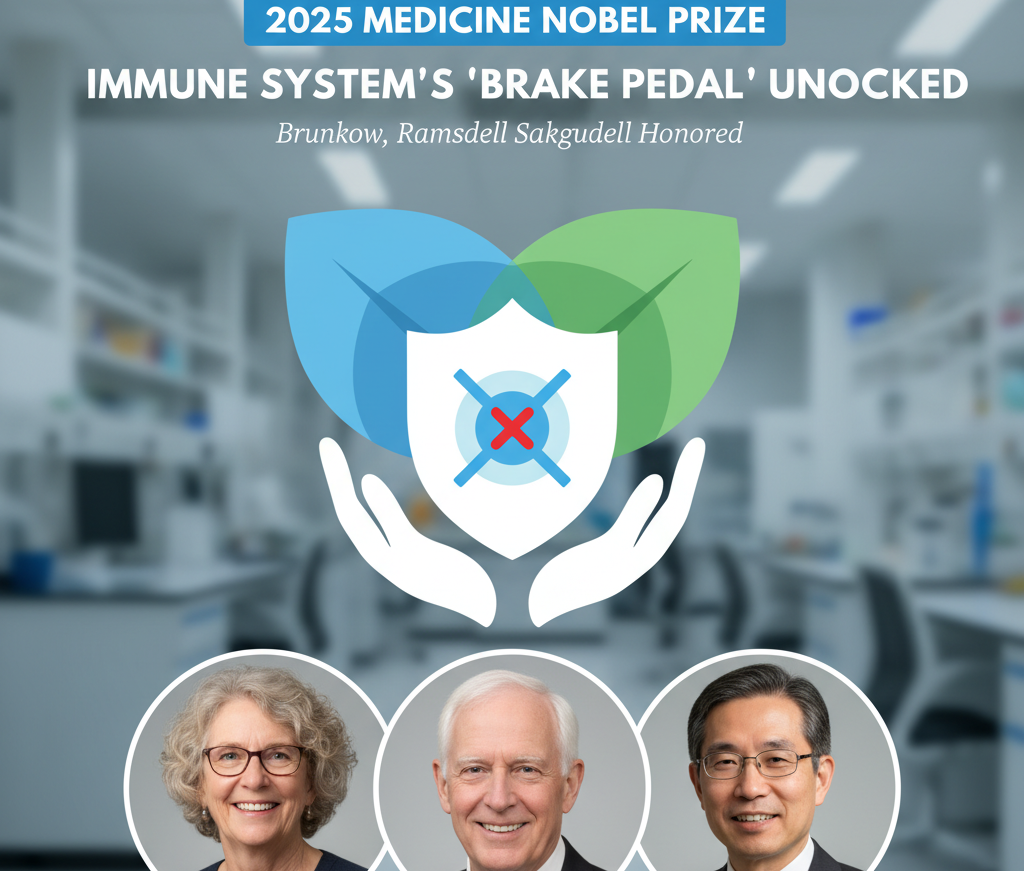Nobel Medicine Triumph: Unlocking the Immune System’s Brakes

Nobel Medicine Triumph
The 2025 Nobel Prize in Physiology or Medicine has been awarded to three scientists—Mary E. Brunkow, Fred Ramsdell, and Shimon Sakaguchi—for their groundbreaking discoveries that solved one of the biggest mysteries in health: how our immune system is stopped from attacking our own body. They were honored “for their discoveries concerning peripheral immune tolerance.”
For years, researchers have known that while the immune system’s T cells are trained in the thymus (a process called central tolerance), some “rogue” self-attacking cells still manage to escape. The question was, what was the crucial backup system? What applied the brakes?
Japanese scientist Shimon Sakaguchi (Osaka University) provided the first answer in 1995 by discovering a new class of cells: Regulatory T cells (Tregs). These peacekeepers patrol the body, actively calming down other T cells to prevent the immune system from causing autoimmune diseases.

The American duo, Mary E. Brunkow (Institute for Systems Biology) and Fred Ramsdell (Sonoma Biotherapeutics), added the critical second piece. In 2001, they found the master control switch—the Foxp3 gene—that dictates whether a T cell becomes one of these crucial T-reg peacekeepers. They showed that mutations in this gene led to devastating autoimmune disorders in both mice and humans.
The collective work of these three laureates has done more than just complete a biological puzzle. It has provided the foundation for a new era of medicine. By learning to control T-regs, scientists are now developing new therapies to treat autoimmune conditions like Type 1 diabetes and arthritis, and to supercharge the immune response against cancer. It is a spectacular and well-deserved recognition of the subtle genius in our biology that protects us every day.
Table of Contents
Disclaimer: This article reports on the announcement of the 2025 Nobel Prize in Physiology or Medicine. The information on the laureates’ discoveries (Regulatory T cells and the Foxp3 gene) is based on the Nobel Assembly’s official citation and widely accepted scientific consensus.



This Nobel Prize in Medicine stuff is fascinating, but honestly, my immune system is still mostly just blocking me from eating the last cookie. The T-reg peacekeepers sound noble, but mine seem more interested in napping on my keyboard. And the Foxp3 gene? Sounds like something my cat needs to control its meowing volume, not my body! Still, good to know these brilliant scientists are out there, even if my own defenses are probably just lazy. Guess Ill stick to taking my chances with that last cookie after all!text to image ai tool free
This Nobel Prize in Medicine stuff is fascinating, but honestly, my immune system is still mostly just blocking me from eating the last cookie. The T-reg peacekeepers sound noble, but mine seem more interested in napping on my keyboard. And the Foxp3 gene? Sounds like something my cat needs to control its meowing volume, not my body! Still, good to know these brilliant scientists are out there, even if my own defenses are probably just lazy. Guess Ill stick to taking my chances with that last cookie after all!quay random
What a delightfully nerdy article! Its fantastic that the Nobel laureates finally cracked the code on Tregs and the Foxp3 gene – my own T-reg peacekeepers seem primarily concerned with achieving peak relaxation on my remote control, not fighting disease. Who knew our immune systems backup brakes were so crucial? While my personal defense force appears more interested in napping than noble vigilance, its reassuring to know brilliant science is happening elsewhere. Perhaps they can work on a gene that helps my Tregs develop a sense of urgency around cleaning the kitchen? In the meantime, Ill continue trusting my (slightly lazy) immune system to manage the last cookie crisis. Well done to Sakaguchi, Brunkow, and Ramsdell!tải video YouTube
What a delightfully nerdy article! Its fantastic that the Nobel laureates finally cracked the code on Tregs and the Foxp3 gene – my own T-reg peacekeepers seem primarily concerned with achieving peak relaxation on my remote control, not fighting disease. Who knew our immune systems backup brakes were so crucial? While my personal defense force appears more interested in napping than noble vigilance, its reassuring to know brilliant science is happening elsewhere. Perhaps they can work on a gene that helps my Tregs develop a sense of urgency around cleaning the kitchen? In the meantime, Ill continue trusting my (slightly lazy) immune system to handle the last cookie… and maybe the laundry.app đếm ngược giờ
What a delightfully nerdy article! Its fantastic that the Nobel laureates finally cracked the code on Tregs and the Foxp3 gene. My own T-reg peacekeepers seem primarily concerned with achieving peak relaxation on my remote control, not fighting disease. Who knew our immune systems backup brakes were so crucial? While my personal defense force appears more interested in napping than noble vigilance, its reassuring to know brilliant science is happening elsewhere. Perhaps they can work on a gene that helps my Tregs develop a sense of urgency around cleaning the kitchen? In the meantime, Ill continue trusting my (slightly lazy) immune system to handle the last cookie and maybe the dishes. Well done to Sakaguchi, Brunkow, and Ramsdell!quay random
What a delightfully nerdy article! Its fantastic that the Nobel laureates finally cracked the code on Tregs and the Foxp3 gene. My own T-reg peacekeepers seem primarily concerned with achieving peak relaxation on my remote control, not fighting disease. Who knew our immune systems backup brakes were so crucial? While my personal defense force appears more interested in napping than noble vigilance, its reassuring to know brilliant science is happening elsewhere. Perhaps they can work on a gene that helps my Tregs develop a sense of urgency around cleaning the kitchen? In the meantime, Ill continue trusting my (slightly lazy) immune system to manage the last cookie and maybe the laundry. Well done to Sakaguchi, Brunkow, and Ramsdell!hẹn giờ online
房中秘术、泡妞把妹、丰胸美体、奇淫巧技!价值十万电子书下载网址:https://www.1199.pw/
Turkey food tours Isaac F. – Kenya https://evolvff.com/?p=3712
⬇️ Muốn dùng mọi lúc? Chọn tải đồng hồ đếm ngược phiên bản web-app (Add to Home Screen), mở nhanh, không quảng cáo gây xao nhãng.
🧩 Brand activities your way using a custom turntable—logos, color palettes, and keyboard shortcuts.
weed gummies bulk orders with discounts
🕒 Lên lịch thuyết trình hay nghỉ giải lao? Chọn Đồng hồ đếm ngược online, đặt phút/giây, âm báo rõ ràng, có fullscreen và chế độ tối để trình chiếu.
Theo dõi series dễ hơn với tải video Bilibili—hỗ trợ phụ đề nếu có.